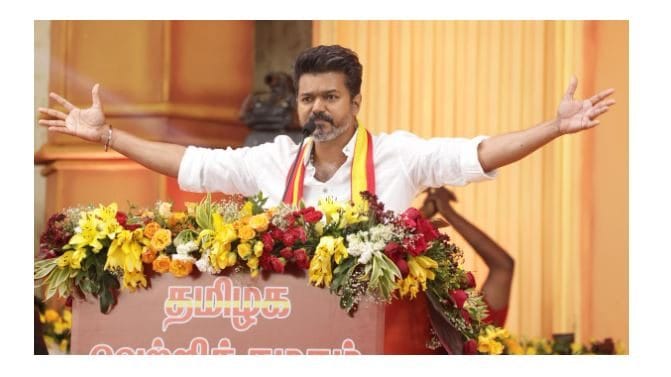Thank you dear subscribers, we are overwhelmed with your response.
Your Turn is a unique section from ThePrint featuring points of view from its subscribers. If you are a subscriber, have a point of view, please send it to us. If not, do subscribe here: https://theprint.in/subscribe/
Actor Vijay’s Tamizhaga Vetri Kazhagam (TVK) held its inaugural conference on October 27, 2024, drawing a massive crowd and generating discussion on his potential influence on Tamil Nadu’s political scene. Vijay’s entry brings new dynamics, especially in a landscape long dominated by Dravidian parties, offering fresh appeal to younger voters.
Vijay as a Political Figure
Vijay’s political move, while anticipated, has captured attention. Known for his wide fanbase, his transition to politics resonates especially with youth who see him as a Reformer. Reports of school and college students interested in TVK highlight his broad appeal, with some even mentioning voting for Vijay, a sign of how his influence reaches beyond the film audience.
Among college students, Vijay’s stance on secularism and his opposition to divisive rhetoric position him as a relatable alternative for those disillusioned with traditional politics. His critiques of separatist ideologies and commitment to unity make him appear as a viable counterbalance to both dynastic politics and the BJP’s identity-based agenda.
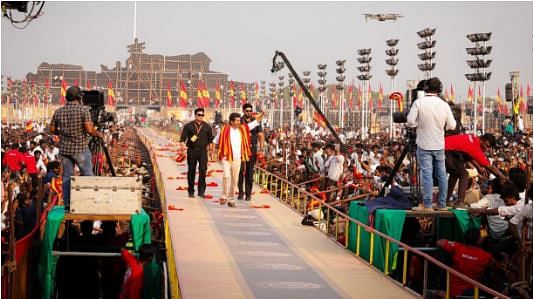
Vijay vs Udhayanidhi Stalin:
A key comparison is emerging between Vijay and Udhayanidhi Stalin, the son of Chief Minister M.K. Stalin and now Deputy Chief Minister. Udhayanidhi, as a DMK youth representative, has crafted his own appeal by taking clear ideological stances, such as his position on Sanatana Dharma. Vijay, by contrast, emphasizes a non-dynastic approach, appealing to younger voters disenchanted with traditional political hierarchies.
At the TVK conference, Vijay’s criticism of the DMK’s ‘family-centered’ governance and BJP’s Hindutva ideology reinforced his image as an independent force. His emphasis on secular Dravidian values while rejecting identity-based politics suggests a unique space, appealing to those tired of traditional lines and divisive narratives.
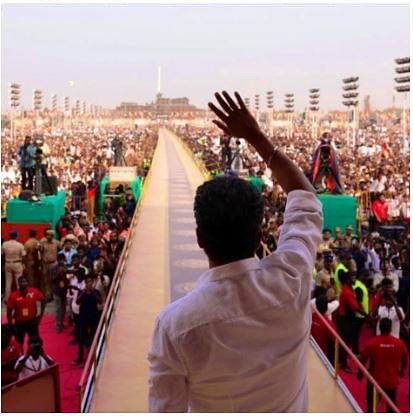
Political Dynamics and the 2026 Assembly Elections
The 2026 Tamil Nadu Assembly elections may be pivotal, with Vijay likely to energize voters alienated from both Dravidian parties and the BJP. His critique of dynastic politics and embrace of secular Dravidian principles makes him a promising alternative for many, including potential defectors from the ADMK who traditionally oppose the DMK.
Vijay’s stance on identity-based politics, his support for Dravidian unity, and his secular message give him a cross-sectional appeal that could disrupt the DMK-BJP rivalry. Should Vijay maintain his advocacy for secular governance, he may draw support from ADMK members and other opposition segments, presenting a difficult third option.
Vijay’s Ambiguous Position on Fascism
Despite his strong debut, Vijay’s political stance includes ambiguities. For example, his comments on ‘fascism’ were satirical, leaving some unclear whether he opposes right-wing ideology or simply critiques anti-fascist stances taken by the DMK and other leftist groups. This raises questions about whether his rhetoric is an authentic stance or a strategy to attract anti-DMK voters.
However, Vijay’s declarations against ‘religious majoritarianism’ and ‘separatist agendas’ hint at a distance from the BJP’s ideological influences. His emphasis on Thiruvalluvar’s principles of equality and his secular Dravidian ideology appeal to voters opposing divisive politics, further distinguishing his position from both the BJP and traditional Dravidian lines.
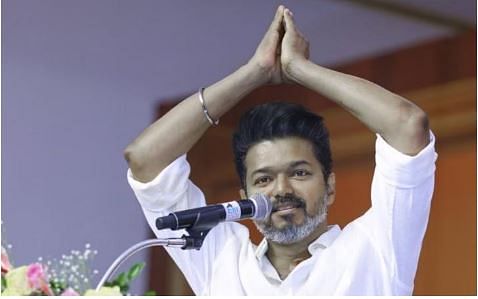
A New Political Strategy
Beyond his celebrity, Vijay’s communication style demonstrates a distinct strategy. His idiomatic, humorous, and impactful speech showcased a media-savvy approach, likely sharpened through his film career. This style kept his audience engaged while conveying an inclusive governance model. Symbolic gestures like receiving copies of the Constitution and religious texts bolstered his image as a secular and inclusive figure, widening his appeal.
Observers, however, are skeptical about whether his stance is sustainable. His established fanbase offers a ‘minimum guarantee’ of support, especially among the youth. But to build a solid political base, he’ll need more than charisma; he’ll require a clear vision that resonates beyond his current following.
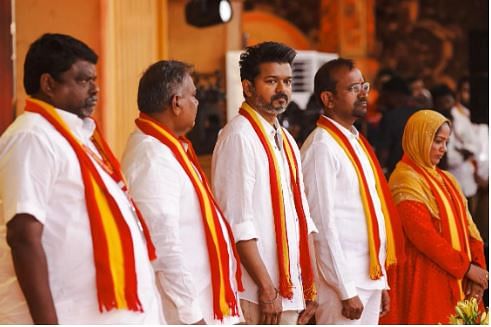
Is TVK a Lasting Political Force?
Vijay’s immediate aim may not be the Chief Minister’s seat but rather to disrupt Tamil Nadu’s political status quo. His recent proposal for coalition ‘Power sharing’ has added a novel, although controversial element to Tamil Nadu’s coalition politics. While this may intrigue potential allies, the early introduction of such a proposal has drawn criticism, with some questioning its impact on his future bargaining power.
TVK’s entry reflects more than a typical celebrity in politics. Vijay’s navigation between Dravidian values and a secular, anti-right stance positions him as a distinct political figure. His ability to maintain this balance, address pressing issues, and expand his appeal will determine whether TVK can live up to its transformative aspirations.
Vijay’s entry into politics presents both challenges and opportunities. As the 2026 elections approach, his campaign will test whether Tamil Nadu’s youth truly desire a new voice, independent of dynastic politics, and committed to a secular, inclusive future. The results will indicate whether Vijay’s influence is a fleeting trend or a sustained force reshaping Tamil Nadu’s political landscape.
These pieces are being published as they have been received – they have not been edited/fact-checked by ThePrint.


